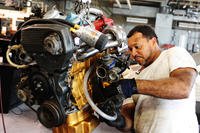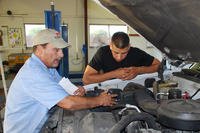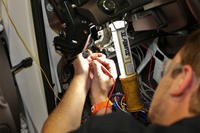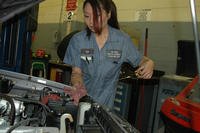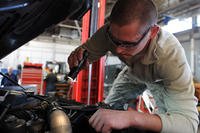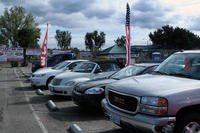This content is provided courtesy of USAA.
"If my van doesn't start, I'm in trouble."
That might be an understatement coming from Leanne Kocsis, a working mom with four boys and a husband who's often called away with the National Guard. For Kocsis, like many Americans, the type of vehicle she drives isn't a matter of amusement or vanity; it's a linchpin in her family's way of life. Not only must it run reliably, it has to accommodate her family of six and all their gear, keep them safe, and get a respectable miles-per-gallon rating. Above all, the loan payments can't rob the family of their college savings.
It doesn't matter if you're a soccer mom, a construction crew chief or a jet-setter — choosing the right vehicle for the family's lifestyle isn't something to take lightly.
"Do your research before you buy," advises Kocsis, director of research and development for MilitaryAvenue.com, an advice website for military families. As a member of financial services provider USAA, she used car-buying tools available at usaa.com to compare vehicles and find the perfect match for her, a Toyota Sienna.
"The car-buying experience is unique to each person," says Steve Thompson, assistant vice president in charge of USAA's Car Buying Service. "We try to help people understand both the cost and value of a vehicle — beyond the sticker price — so they can get the right car for their needs."
Whether working through a car-buying service or going it alone, savvy shoppers get the most for their money by weighing all options in advance. Start your search with these factors in mind.
1. Category and ClassMost buyers already know if they're in the market for a family-hauler versus a hot rod, but narrowing it down from there can get more difficult. What's better for a hockey-coaching, drum-playing accountant — an SUV or a minivan?
"Think hard about your lifestyle and how you're going to use the car most often," says Thompson. "Are you off-roading in the mountains or cruising around the suburbs? Separating your ‘wants' from your ‘needs' can help you make a more practical choice."
Vehicles of a similar size and shape range from thrifty to downright opulent. A glance around the Web, with a realistic sense of your budget, might help you rule out some models right away.
2. Used vs. NewThe standard advice from consumer advocates used to be that buying "gently used" was a smart way to get a like-new car for less money.
"That decision has gotten more complicated," says Jesse Toprak, vice president of industry trends for TrueCar.com. "Resale values for used cars have risen in recent years, and now manufacturers are offering very attractive rebates and financing incentives on new vehicles. Combine that with the full warranty of a new car, and in some cases new will be a better deal than used."
3. Fuel EconomyIt's no secret that soaring prices at the pump increase the demand for fuel-efficient vehicles. But don't base your purchase on gas prices alone. Carefully consider your driving habits and whether you rack up enough mileage to make fuel economy an important financial factor.
Kocsis, for example, carts her kids all over town and makes frequent five-hour trips to visit family out of state. For her, fuel efficiency was a must-have.
Double-check your math if you're eyeing a hybrid vehicle. Unless you're a road warrior, the increased fuel economy of a hybrid may not pay you back for the higher upfront purchase price.
And what about electric cars? The technology (and the infrastructure to support it) is still in its infancy, and both Toprak and Thompson agree that buying in at this early stage is risky for cost-conscious consumers.
4. SafetyAuto accidents can ruin lives, so safety should play a role in every car-buying decision. You can find crash test ratings for most cars at Insurance Institute for Highway Safety.
All the same, who you are will impact how much emphasis you place on auto safety. Most new cars come with extensive safety features, such as air bags, antilock brakes and crumple zones, and the list of such standards gets longer every year. You can decide whether additional precautions, such as a rearview camera or a voice-controlled MP3 player, are worth the extra cost.
5. ReliabilityThat sedan looks great, but will it hold up? Objective research tools, such as Consumer Reports and TrueDelta.com, offer predictions of reliability based on their own road tests, consumer surveys and other historical data.
To get another hint of whether your car will zoom or sputter, check the used car listings for the vehicle you're considering and compare it to others in the same class. If it tends to sell for much less, that might be an indication of poor performance.
For new cars, the reports on reliability are generally positive.
"Extreme competition in the auto industry has led manufacturers to concentrate heavily on quality, and consumers have benefited," says Toprak. "There are no real clunkers."
If reliability is a concern, consider an extended warranty. Extended warranties come in all shapes and sizes, so do your homework. Lower end warranties might cover only major mechanical breakdowns; mid-priced contracts may also cover normal wear and tear; and the most expensive contracts are bumper-to-bumper, covering all but a few types of repairs.
6. Insurance CostsYour age, where you live and how you drive all affect your insurance premiums. But your car makes up the other half of the equation. You might pay more to insure a vehicle that has been involved in more accidents, causes more damage, costs more to repair or is stolen more frequently than other models.
"As a general rule, sports cars are more expensive to insure than station wagons," says Phil Leininger, vice president in charge of auto insurance for USAA's Property & Casualty Company. "But if you're on the fence between two similar models, a quote from your insurance company might help you decide."
7. FinancingDon't wait until you're at the dealership to start the conversation on financing. You can shop for an auto loan just like you'd shop for a pair of shoes, finding the right fit for your budget. A lower annual percentage rate could save you hundreds of dollars over the life of the loan, even if it means passing up a cash rebate from the dealer.
"We got pre-approved for an auto loan from our bank first and gave the dealer the chance to match it," says Kocsis. "They couldn't even come close."
With her always-on-the-go lifestyle, Kocsis might not be certain where her van will take her next. But she knows one thing: She got a vehicle that meets her family's needs.
Eliminate the GuessworkWith hundreds of models to consider, choosing the right car can be a time-consuming and confusing experience. To make it easier, some service providers do the research for you.
USAA's "Best Value" list, for example, uses quantitative data to recommend one vehicle in each of 16 categories, from SUVs to compacts, as the best overall buy. USAA ranks vehicles by relating the purchase price to a litany of other factors affecting safety, power, reliability, fuel efficiency, insurance costs and more. The 2011 list is available at www.usaa.com/bestvalue.
For a wider range of choices, USAA includes honorable mentions on its "Preferred" list of vehicles.




